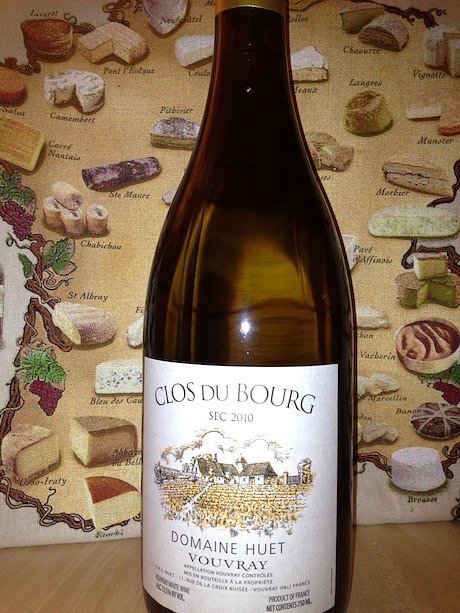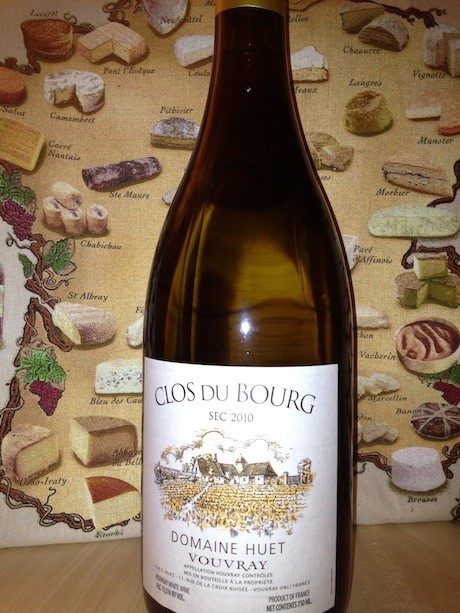French Wines: Domaine Huet 2010 Clos du Bourg

Tue 19 Mar 2013

Domaine Huet 2010 Clos du Bourg
Approximate retail price: $30–$35
Available at major retailers such as Zachys and Crush
Is it possible to be inspired for $30? This may sound like a snobbish question with regard to French wines, but, as with most of my purchases in adulthood, the quality I demand from certain items has increased as I’ve gotten older. Take art: in college, I happily thumbtacked dog-eared posters to my walls; I’ve thankfully moved on to purchasing actual pieces of framed art. Likewise, I’ve moved on from chugging jungle juice and Zimas to consuming really nice bottles of wine, some of which have rivaled my monthly rent payment. I’m not saying that all good French wine has to be expensive—that’s far from the truth. But if I’m going to spend any money at all on a bottle of wine—if I pull that cork after a damned hard day of work, traffic and well, life, hoping to take that first sip and sigh in content—I don’t want to be disappointed. Life is too short to drink plonk, even if it’s cheap plonk.
I’m happy to write that this month’s wine, Domaine Huet’s Clos du Bourg Sec 2010, is anything but plonk. The domaine was founded in 1928, when, at the urging of his doctor, Victor Huet returned to his native Loire Valley with his wife, Anna-Constance. Victor had been exposed to mustard gas while fighting in World War I, and had to leave his life running a bistro in Paris behind for the cleaner air of the countryside. Together, he and Anna-Constance bought a vineyard in the region of Vouvray and forged a new life in wine. Their son, Gaston, was set to take over the domaine in the 1930s, but, in a sad twist of irony and fate, like his father, Gaston had to serve his country. As with many of his compatriots, Gaston was drafted to fight on the front lines during World War II.
Perhaps one of the reasons I find this wine so inspiring is because of Gaston’s recollection of the importance of wine during his painful war experience. When asked to name the best wine he had ever tasted, Gaston, then in his 80s, recalled one wine he had drunk during the war. While he couldn’t even recall the name of it, the memory of it was indelibly etched in his mind. It was the only wine he drank during the entire five years he was held prisoner by the Nazis. Significantly, it was a dry white from the Loire Valley—green and underripe, but a memory of home that gave him and his fellow prisoners “something to hold on to. Talking about wine and sharing it made all of us feel closer to home and more alive. . . . It was nothing special and there was only a thimbleful . . . but it was glorious, and the best wine I ever drank.” It was this memory that sparked the concept for the wonderful book Wine and War—a great read for any wine and/or history lover.
It is not just the history of the domaine that makes this wine so inspirational to me, but also how lovely this 100 percent chenin blanc tastes, either on its own or with food. Honey? Check. White flowers? Check. Minerality and acid? Check, check. There’s also a note of something more piquant in this wine—a touch of horseradish or freshly grated wasabi, which is a lovely counterbalance to the textbook honey, golden apple and lemony notes of chenin blanc. Even better, this wine, and chenin blanc in general, tends to be a wonderfully versatile food wine. The acid cuts through creamy sauces and soups; the honeyed sweetness makes it a perfect accompaniment for spicier foods. It’s rich enough to stand up to roast chicken but light enough to enjoy with seafood or on its own as an aperitif. Pair it with its divine array of native Loire Valley chèvres, such as the tasty crottin de Chavignol or Sainte-Maure de Tripaine. Definitely enjoy it as a foil to dishes like a tasty onion-and-leek tart.
Domaine Huet has two other stellar vineyard sites, Le Mont and Le Haut Lieu; as with Clos du Bourg, both sec and demi-sec wines are produced (demi-secs have more residual sugar than secs and are therefore sweeter). The domaine also produces two sparkling wines and various moelleux cuvées, the rarest being Cuvée Constance, named for Victor Huet’s wife, which is only made in the best years for botrytis. When ordering any bottle of Domaine Huet, note that the “t” in “Huet” is very gently pronounced. The sommelier may beg to differ, but you’re in the know!
Editor’s note: Food and wine lovers heading to Paris might want to try one of the Girls’ Guide’s favorite cooking classes in Paris.